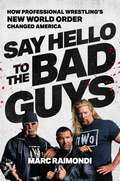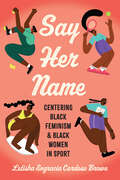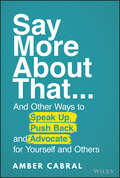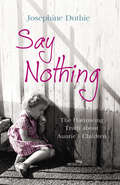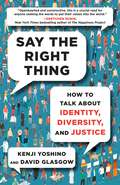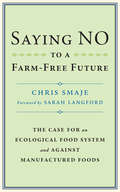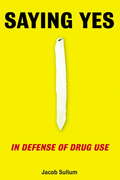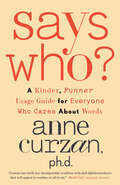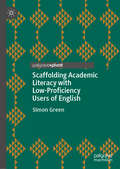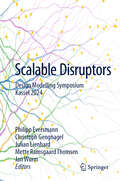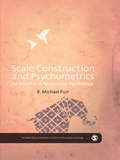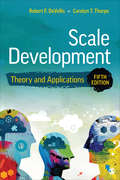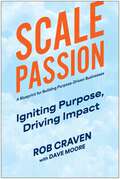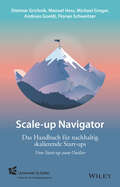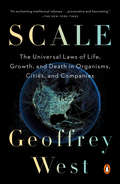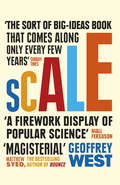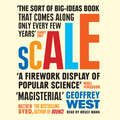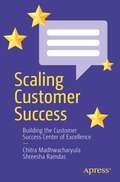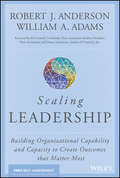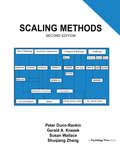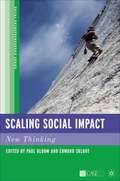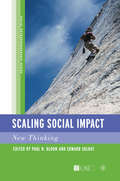- Table View
- List View
Say Hello to the Bad Guys: How Professional Wrestling's New World Order Changed America
by Marc RaimondiFrom ESPN reporter Marc Raimondi comes a compelling, gripping narrative history of professional wrestling&’s legendary faction, The NWO (New World Order), from their inception in 1996 to their influence on American pop culture today. In 1996, professional wrestling was one of the most watched sports on cable television, with more than 5 million people tuning in every week. And in the late 1990s, pro-wrestling was the hottest thing in American pop culture, with companies making millions in action figures, video games, and simple black t-shirts emblazoned with three little letters: NWO. The NWO, or New World Order, became a business like no other, and was responsible for the explosive ratings and rabid fanbase. It started with an ingenious storyline starring Scott Hall, Kevin Nash, and the titular Hollywood Hogan—Hulk Hogan gone bad. Together, they formed a new era of characters to root for: The Bad Guys. Never before had audiences cheered for the villains, rooting for them over the heroes. The NWO broke down wrestling&’s fourth wall in a clever new way, blurring the lines between fiction and reality. And suddenly, watching professional wrestling not only became socially acceptable, but a necessity if you wanted to stay up to date with pop culture. Their impact was infectious and long-lasting. It was entertainment that shaped a generation. Written by Marc Raimondi, a current ESPN reporter with nearly twenty years of experience in journalism, this narrative history explores professional wrestling&’s most popular faction and how their existence influenced American culture like never before.
Say Her Name: Centering Black Feminism and Black Women in Sport (Critical Issues in Sport and Society)
by Letisha Engracia BrownSay Her Name: Centering Black Feminism and Black Women in Sports offers an in-depth look into the lived experiences of Blackgirlwomen as athletes, activists, and everyday people through a Black feminist lens. With so much research on race centered on Black men and gender research focusing on white women, Say Her Name offers a necessary conversation that places Blackgirlwomen at the center of discussion. Say Her Name delves deeply into issues of gender, the politics of punishment, athlete activism, the politics of Black hair, fingernails and fashion, and the representation and commodification of Blackgirlwomen in sport and society. An entry point into the growing research in sport studies and beyond from a Black feminist lens, Say Her Name offers a clear window into the power and potential of nuanced examinations of sport. As a reflection of the larger social world, sport provides a framework for understanding larger social issues, including racism, sexism, and misogynoir. Blackgirlwomen have varied experiences in sport, and Say Her Name provides a window into those experiences. The book discusses Black women in sports including the South African runner Caster Semenya and the American runners Florence Griffith Joyner and Sha’Carri Richardson, as well as Venus and Serena Williams, Gabby Douglas, and Simone Biles. The women in this book have lived experiences that speak to the larger experiences of Black women and girls in sport and society, while also leaning into a larger discussion of the importance of the social movement #SayHerName.
Say More About That: ...And Other Ways to Speak Up, Push Back, and Advocate for Yourself and Others
by Amber CabralConcrete strategies to call out wrongdoing at home, at work, at school, and elsewhere In Say More About That, veteran inclusion strategist, coach, writer, and speaker Amber Cabral delivers an incisive and practical guide to assertively addressing inequitable treatment you see at home, work, school, and other settings. The book offers a complete communications toolkit for equity advocacy you can deploy on your own behalf and on behalf of others. You&’ll get the tactics, context, and tools that make being brave and speaking up a lot easier. You&’ll also find: A thorough discussion of the fundamentals of inclusion and equity, including concepts of advocacy and allyship, privilege, and identity An examination of the social landscape that makes speaking up so daunting Explorations of the most effective language and tactics you can use when you make a stand for yourself or others The perfect resource for underrepresented professionals, allies, advocates, and people seeking to make a positive difference in the world, Say More About That is the assertiveness manual you need if you&’ve been meaning to speak up but are worried about being drowned out.
Say Nothing: The Harrowing Truth About Auntie's Children
by Josephine DuthieSay Nothing is the moving true story of four neglected siblings who were taken into care following the breakdown of their parents' marriage. Sent to a small croft in the north-east of Scotland, they endured an onslaught of physical and mental abuse at the hands of an elderly, inexperienced foster mother. For ten years the children's cries for help were ignored and misunderstood in the naive social-work climate of the late 1950s, and this heartbreaking personal account of cruelty and neglect reveals the effect this maltreatment had on their ability to adjust to a normal adult life.Say Nothing was written as a voice of support for all abused children who are afraid or were never given the chance to tell their story.
Say the Right Thing: How to Talk About Identity, Diversity, and Justice
by Kenji Yoshino David GlasgowA Living Now Book Awards Gold Medalist, Social Activism/Charity A practical, shame-free guide for navigating conversations across our differences at a time of rapid social change.In the current period of social and political unrest, conversations about identity are becoming more frequent and more difficult. On subjects like critical race theory, gender equity in the workplace, and LGBTQ-inclusive classrooms, many of us are understandably fearful of saying the wrong thing. That fear can sometimes prevent us from speaking up at all, depriving people from marginalized groups of support and stalling progress toward a more just and inclusive society. Kenji Yoshino and David Glasgow, founders of the Meltzer Center for Diversity, Inclusion, and Belonging at NYU School of Law, are here to show potential allies that these conversations don&’t have to be so overwhelming. Through stories drawn from contexts as varied as social media posts, dinner party conversations, and workplace disputes, they offer seven user-friendly principles that teach skills such as how to avoid common conversational pitfalls, engage in respectful disagreement, offer authentic apologies, and better support people in our lives who experience bias. Research-backed, accessible, and uplifting, Say the Right Thing charts a pathway out of cancel culture toward more meaningful and empathetic dialogue on issues of identity. It also gives us the practical tools to do good in our spheres of influence. Whether managing diverse teams at work, navigating issues of inclusion at college, or challenging biased comments at a family barbecue, Yoshino and Glasgow help us move from unconsciously hurting people to consciously helping them.
Saying NO to a Farm-Free Future: The Case For an Ecological Food System and Against Manufactured Foods
by Chris Smaje“Everyone in the food business needs to read this book. . . . [A] lively and superbly written polemic.”—Joel Salatin, co-founder of Polyface Farm A defense of agroecological, small-scale farming and a robust critique of an industrialized future. One of the few voices to challenge The Guardian's George Monbiot on the future of food and farming (and the restoration of nature) is academic, farmer and author of A Small Farm Future Chris Smaje. In Saying NO to a Farm-Free Future, Smaje presents his defense of small-scale farming and a robust critique of Monbiot’s vision for an urban and industrialized future. Responding to Monbiot’s portrayal of an urban, high-energy, industrially manufactured food future as the answer to our current crises, and its unchallenged acceptance within the environmental discourse, Smaje was compelled to challenge Monbiot’s evidence and conclusions. At the same time, Smaje presents his powerful counterargument – a low-carbon agrarian localism that puts power in the hands of local communities, not high-tech corporates. In the ongoing fight for our food future, this book will help you to understand the difference between a congenial, ecological living and a dystopian, factory-centered existence. A must-read! "Chris Smaje has laid down an indictment – as unremitting as it is undeniable – that cuts through the jargon-filled, techno-worshipping agricultural futurists who promise silver-bullet fixes for having your cake and eating it too. This brilliant and compelling book is at once hopeful and persuasive about the future of food."—Dan Barber, chef at Blue Hill and author of The Third Plate
Saying NO to a Farm-Free Future: The Case For an Ecological Food System and Against Manufactured Foods
by Chris Smaje&“Everyone in the food business needs to read this book. . . . [A] lively and superbly written polemic.&”—Joel Salatin, co-founder of Polyface FarmNamed the Inc. Non-Obvious Book Awards "Best Books of 2023"A defense of agroecological, small-scale farming and a robust critique of an industrialized future.One of the few voices to challenge The Guardian's George Monbiot on the future of food and farming (and the restoration of nature) is academic, farmer and author of A Small Farm Future Chris Smaje. In Saying NO to a Farm-Free Future, Smaje presents his defense of small-scale farming and a robust critique of Monbiot&’s vision for an urban and industrialized future.Responding to Monbiot&’s portrayal of an urban, high-energy, industrially manufactured food future as the answer to our current crises, and its unchallenged acceptance within the environmental discourse, Smaje was compelled to challenge Monbiot&’s evidence and conclusions. At the same time, Smaje presents his powerful counterargument – a low-carbon agrarian localism that puts power in the hands of local communities, not high-tech corporates.In the ongoing fight for our food future, this book will help you to understand the difference between a congenial, ecological living and a dystopian, factory-centered existence. A must-read!"Chris Smaje has laid down an indictment – as unremitting as it is undeniable – that cuts through the jargon-filled, techno-worshipping agricultural futurists who promise silver-bullet fixes for having your cake and eating it too. This brilliant and compelling book is at once hopeful and persuasive about the future of food."—Dan Barber, chef at Blue Hill and author of The Third Plate
Saying Yes: In Defense of Drug Use
by Jacob SullumJacob Sullum goes beyond debate on legalization or the proper way to win the "war on drugs," to the heart of a social and individual defense of using drugs. Saying Yesargues that the all-or-nothing thinking that has long dominated discussions of illegal drug use should give way to a wiser, subtler approach. Exemplified by the tradition of moderate drinking, such an approach rejects the idea that there is something inherently wrong with using chemicals to alter one's mood or mind. Saying Yesfurther contends that the conventional understanding of addiction, portraying it as a kind of chemical slavery in which the user's values and wishes do not matter, is also fundamentally misleading. Writing in a lively and provocative style that earned him critical acclaim for his previous book, Sullum contrasts drug use as it is described by politicians and propagandists with drug use as it is experienced by the silent majority of users. The lives they lead challenge a central premise of the war on drugs: the idea that certain substances have the power to compel immoral behavior.
Says Who?: A Kinder, Funner Usage Guide for Everyone Who Cares About Words
by Anne CurzanA kinder, funner usage guide to the ever-changing English language and a useful tool for both the grammar stickler and the more colloquial user of English, from linguist and veteran professor Anne Curzan &“I was bowled over, page after page, by the author&’s fine ear for our language and her openhearted erudition. I learned a lot, and I couldn&’t have enjoyed myself more.&”—Benjamin Dreyer, New York Times bestselling author of Dreyer&’s EnglishOur use of language naturally evolves and is a living, breathing thing that reflects who we are. Says Who? offers clear, nuanced guidance that goes beyond &“right&” and &“wrong&” to empower us to make informed language choices. Never snooty or scoldy (yes, that&’s a &“real&” word!), this book explains where the grammar rules we learned in school actually come from and reveals the forces that drive dictionary editors to label certain words as slang or unacceptable.Linguist and veteran English professor Anne Curzan equips readers with the tools they need to adeptly manage (a split infinitive?! You betcha!) formal and informal writing and speaking. After all, we don&’t want to be caught wearing our linguistic pajamas to a job interview any more than we want to show up for a backyard barbecue in a verbal tux, asking, &“To whom shall I pass the ketchup?&” Curzan helps us use our new knowledge about the developing nature of language and grammar rules to become caretakers of language rather than gatekeepers of it. Applying entertaining examples from literature, newspapers, television, and more, Curzan welcomes usage novices and encourages the language police to lower their pens, showing us how we can care about language precision, clarity, and inclusion all at the same time.With lively humor and humanity, Says Who? is a pragmatic and accessible key that reveals how our choices about language usage can be a powerful force for equity and personal expression. For proud grammar sticklers and self-conscious writers alike, Curzan makes nerding out about language fun.
Scaffolding Academic Literacy with Low-Proficiency Users of English
by Simon GreenThis book analyses the development of academic literacy in low-proficiency users of English in the Middle East. It highlights the challenges faced by students entering undergraduate education in the region, and the strategies used by teachers to overcome them. The author focuses on a large-scale undergraduate teacher programme run in Oman by the University of Leeds, providing clear pointers both for future research and effective practice. He also explores the implications of his findings for countries beyond the Gulf Cooperation Council, demonstrating how international participation in UK HE could be much wider. This book will appeal to students and scholars with an interest in academic literacies and English for Academic Purposes.
Scaffolding Language
by Pauline GibbonsThe bestselling Scaffolding Language, Scaffolding Learning helped tens of thousands of mainstream elementary teachers ensure that their English language learners became full members of the school community with the language and content skills they needed for success. In the highly anticipated Second Edition, Pauline Gibbons updates her classic text with a multitude of practical ideas for the classroom, supported by the latest research in the field of ELL/ESL. With clear directions and classroom tested strategies for supporting students' academic progress, Gibbons shows how the teaching of language can be integrated seamlessly with the teaching of content, and how academic achievement can be boosted without sacrificing our own vision of education to the dictates of knee-jerk accountability. Rich examples of classroom discourse illustrate exactly how the scaffolding process works, while activities to facilitate conversation and higher-level thinking put the latest research on second language learning into action.
Scalable Disruptors: Design Modelling Symposium Kassel 2024
by Christoph Gengnagel Mette Ramsgaard Thomsen Jan Wurm Philipp Eversmann Julian LienhardThis book reflects and expands on current trends in the Architecture, Engineering and Construction (AEC) industries as they respond to the unfolding climate and biodiversity crisis. Shifting away from the traditional focuses, which are narrowly centered on efficiency, this book presents a variety of approaches to move the AEC community from a linear, extractive paradigm to circular and regenerative one. The book presents contributions including research papers and case studies, providing a comprehensive overview of the field as well as perspectives from related disciplines, such as computer science, biology and material science.
Scale Construction and Psychometrics for Social and Personality Psychology: For Social And Personality Psychology (The SAGE Library of Methods in Social and Personality Psychology)
by R. Michael FurrProviding conceptual and practical foundations in scale construction and psychometrics for producers and consumers of social/personality research, this guide covers basic principles, practices, and processes in scale construction, scale evaluation, scale use, and interpretation of research results in the context of psychological measurement. It explains fundamental concepts and methods related to dimensionality, reliability, and validity. In addition, it provides relatively non-technical introductions to special topics and advanced psychometric perspectives such as Confirmatory Factor Analysis, Generalizability Theory, and Item Response Theory. The SAGE Library in Social and Personality Psychology Methods provides students and researchers with an understanding of the methods and techniques essential to conducting cutting-edge research. Each volume within the Library explains a specific topic and has been written by an active scholar (or scholars) with expertise in that particular methodological domain. Assuming no prior knowledge of the topic, the volumes are clear and accessible for all readers. In each volume, a topic is introduced, applications are discussed, and readers are led step by step through worked examples. In addition, advice about how to interpret and prepare results for publication are presented.
Scale Development: Theory and Applications (Applied Social Research Methods)
by Robert F. DeVellis Carolyn T. ThorpeScale Development: Theory and Applications, by Robert F. DeVellis and new co-author Carolyn T. Thorpe, demystifies measurement by emphasizing a logical rather than strictly mathematical understanding of concepts. The Fifth Edition includes a new chapter that lays out the key concepts that distinguish indices from scales, contrasts various types of indices, suggests approaches for developing them, reviews validity and reliability issues, and discusses in broad terms some analytic approaches. All chapters have been updated, and the book strikes a balance between including relevant topics and highlighting recent developments in measurement while retaining an accessible, user-friendly approach to the material covered.
Scale Development: Theory and Applications (Applied Social Research Methods)
by Robert F. DeVellis Carolyn T. ThorpeScale Development: Theory and Applications, by Robert F. DeVellis and new co-author Carolyn T. Thorpe, demystifies measurement by emphasizing a logical rather than strictly mathematical understanding of concepts. The Fifth Edition includes a new chapter that lays out the key concepts that distinguish indices from scales, contrasts various types of indices, suggests approaches for developing them, reviews validity and reliability issues, and discusses in broad terms some analytic approaches. All chapters have been updated, and the book strikes a balance between including relevant topics and highlighting recent developments in measurement while retaining an accessible, user-friendly approach to the material covered.
Scale Passion: Igniting Purpose, Driving Impact
by Rob CravenWe&’ve been duped into believing a number of unhelpful notions about starting and leading a successful company, not least of all that profit and purpose are mutually exclusive. Rob Craven believes that we can evolve toward a better kind of capitalism. Infuse purpose and passion into all parts of your company so that as your business grows and flourishes, so does your impact.Scaling a business is a straightforward endeavor—grow and expand your company while maintaining efficiency and profitability. Impact-minded leaders need a field guide for generating both economic value and contributing to societal well-being. Let Scale Passion be your companion on the journey to building a company whose social impact differentiates you from the competition, drives exceptional employee engagement, and becomes a prized asset for your stakeholders and investors. CEO, investor, consultant, and founder of ScalePassion Rob Craven empowers you to leverage your organizations as a force for good by showing you how to: Elevate your leadership by tapping into your personal purpose, passion, and power Scale your purpose and passion by building an impact-minded company/team Inspire an ever-widening circle of customers, investors, and community stakeholders Organized around his father&’s three most important principles for living—be bold as hell, do it right, commit to making a difference—Craven&’s guidance is a mentorship-in-your-pocket resource for cultivating your superpowers as a leader. Scale Passion offers a proven, practical method for building a successful, impact-minded organization and achieving your change-the-world goals, featuring inspiring stories of leaders who are doing just that.
Scale-up-Navigator: Das Handbuch für nachhaltig skalierende Start-ups - vom Start-up zum Outlier
by Andreas Goeldi Dietmar Grichnik Michael Greger Manuel Hess Florian SchweitzerMit Case Studies von Scale-ups wie DeepL, SumUp, 1KOMMA5°, Frontify oder Ledgy! Europa hat mit seinen über 700 Millionen EinwohnerInnen einen großen Binnenmarkt, auf dem aber keine Technologieunternehmen vom Kaliber globaler Big Techs wie Apple, Alphabet/Google, Amazon, Meta/Facebook oder Microsoft gelistet sind. In der ersten Digitalisierungswelle des Internets genossen die USA durch ihren homogenen Heimatmarkt einen klaren Wachstumsvorteil. Dies mag sich durch maschinelle Übersetzungstools und weitere KI-unterstützte Lösungen ändern. Hierzu muss die Skalierung von europäischen Unternehmen erlernt werden. Sie ist eine entscheidende Fähigkeit in einem Spiel auf Zeit: Start-ups müssen wachsen, bevor ihre Konkurrenz aus anderen Start-ups oder etablierten Unternehmen an ihnen vorbeizieht. Dazu gilt es, den gestiegenen Anforderungen an die soziale und ökologische Nachhaltigkeit sowie Unternehmensführung (ESG) gerecht zu werden. Dieses Buch vermittelt Leitlinien für GründerInnen, Mitarbeitende, Investoren/Investorinnen, Mentoren/Mentorinnen und weitere Stakeholder von skalierenden Start-ups, sogenannten "Scale-ups", die sie beim schnellen und nachhaltigen Wachstum unterstützen. Sie entwickeln damit ein besseres Verständnis für verschiedenste Herausforderungen bei der Skalierung ihres Unternehmens und meistern diese besser, wie beispielsweise die Entwicklung und Führung ihres Teams, die Bewertung von Wachstums- und Finanzierungsoptionen sowie die Implementierung effizienter Organisationsstrukturen und Kommunikationsprozesse. Die LeserInnen profitieren konkret von: - einer Strukturierung der Skalierung, basierend auf einem iterativen Prozess-Framework; - einem durchgehenden Fokus auf für den Kapitalmarkt relevante ESG-Kriterien; - Handlungsempfehlungen inklusive digitaler Tools, welche sie bei der Skalierung ihrer Unternehmen unterstützen.
Scale: The Universal Laws of Growth, Innovation, Sustainability, and the Pace of Life in Organisms, Cities, Economies, and Companies (Santa Fe Institute Studies On The Sciences Of Complexity)
by Geoffrey WestFrom one of the most influential scientists of our time, a dazzling exploration of the hidden laws that govern the life cycle of everything from plants and animals to the cities we live in.Visionary physicist Geoffrey West is a pioneer in the field of complexity science, the science of emergent systems and networks. The term “complexity” can be misleading, however, because what makes West’s discoveries so beautiful is that he has found an underlying simplicity that unites the seemingly complex and diverse phenomena of living systems, including our bodies, our cities and our businesses. Fascinated by aging and mortality, West applied the rigor of a physicist to the biological question of why we live as long as we do and no longer. The result was astonishing, and changed science: West found that despite the riotous diversity in mammals, they are all, to a large degree, scaled versions of each other. If you know the size of a mammal, you can use scaling laws to learn everything from how much food it eats per day, what its heart-rate is, how long it will take to mature, its lifespan, and so on. Furthermore, the efficiency of the mammal’s circulatory systems scales up precisely based on weight: if you compare a mouse, a human and an elephant on a logarithmic graph, you find with every doubling of average weight, a species gets 25% more efficient—and lives 25% longer. Fundamentally, he has proven, the issue has to do with the fractal geometry of the networks that supply energy and remove waste from the organism’s body. West’s work has been game-changing for biologists, but then he made the even bolder move of exploring his work’s applicability. Cities, too, are constellations of networks and laws of scalability relate with eerie precision to them. Recently, West has applied his revolutionary work to the business world. This investigation has led to powerful insights into why some companies thrive while others fail. The implications of these discoveries are far-reaching, and are just beginning to be explored. Scale is a thrilling scientific adventure story about the elemental natural laws that bind us together in simple but profound ways. Through the brilliant mind of Geoffrey West, we can envision how cities, companies and biological life alike are dancing to the same simple, powerful tune.
Scale: The Universal Laws of Life and Death in Organisms, Cities and Companies
by Geoffrey WestGeoffrey West's research centres on a quest to find unifying principles and patterns connecting everything, from cells and ecosystems to cities, social networks and businesses.Why do organisms and ecosystems scale with size in a remarkably universal and systematic fashion?Is there a maximum size of cities? Of animals and plants? What about companies?Can scale show us how to create a more sustainable future?By applying the rigour of physics to questions of biology, visionary physicist Geoffrey West found that despite the riotous diversity in the sizes of mammals, they are all, to a large degree, scaled versions of each other. This speaks to everything from how long we can expect to live to how many hours of sleep we need. He then made the even bolder move of exploring his work's applicability to cities and to the business world. These investigations have led to powerful insights about the elemental natural laws that bind us together in profound ways, and how all complex systems are dancing to the same simple tune, however diverse and unrelated they may seem.
Scale: The Universal Laws of Life and Death in Organisms, Cities and Companies
by Geoffrey WestGeoffrey West's research centres on a quest to find unifying principles and patterns connecting everything, from cells and ecosystems to cities, social networks and businesses.'An absolutely riveting read . . . groundbreaking' Marcus du Sautoy'This book will expand your thinking from three dimensions to four' Nassim Nicholas Taleb'Scale is a firework display of popular science' Niall Ferguson'This is an important and original book, of immense scope' Lord Martin Rees, Astronomer RoyalScale addresses big, urgent questions about global sustainability, population explosion, urbanization, ageing, cancer, human lifespans and the increasing pace of life, but also encourages us to question the world around us. Why can we live for 120 years but not for a thousand? Why does the pace of life continually increase? Why do mice live for just two or three years and elephants for up to 75? Why do companies behave like mice, and are they all destined to die? Do cities, companies and human beings have natural, pre-determined lifespans? Are we just a fascinating experiment in natural selection that is ultimately doomed to fail? And what is the origin of the magic number 4 that seems to determine much of physiology and life-history from birth to death?Read by Bruce Mann(p) 2017 Penguin Random House
Scaling Customer Success: Building the Customer Success Center of Excellence
by Chitra Madhwacharyula Shreesha RamdasCustomer Success is a relatively a new discipline that focuses on maximizing customer business value and outcomes realization. Practitioners focus on customer adoption, customer experience and then positive correlation, organic growth and retention is achieved. This book will provide a practical guide for operationalizing the Customer Success function and methodologies. As we now step into the next phase of Customer Success, a phase of growth and standardization, it becomes important to start thinking about how to effectively scale this extremely important function. You'll see how to go from just offering a taste of Customer Success experience to your top customers, to offering it to all your customers, irrespective of their tier, spending, and current growth potential. As you expand the scope of Customer Success across all your customers, it becomes very important to understand how to operationalize Customer Success, how to convert the philosophies and ideas and best practices to usable operational models, and how to build a Customer Success Center of Excellence (CoE) focused on standardizing, scaling and expanding Customer Success practices and methodologies to optimize customer and company success and ROI. Scaling Customer Success will show you what kind of operational processes and workflows need to be put in place based on the stage of your company, products, customer engagement model and desired outcomes, what metrics are important to measure and how to capture those metrics. You'll also study what kinds of workflows to establish, how to effectively map and analyze results and most importantly, how to do Customer Success at scale effectively.What You'll Learn• Understand what a Customer Success Center of Excellence is• Establish a blueprint for how to scale and automate a Customer Success practice• Review information on key Customer Success metrics and workflowsWho This Book Is ForCompany leaders and customer success managers
Scaling Leadership: Building Organizational Capability and Capacity to Create Outcomes that Matter Most
by Robert J. Anderson Ed Catmull William A. AdamsTransform Your Organization by Scaling Leadership How do senior leaders, in their own words, describe the most effective leaders—the ones that get results, grow the business, enhance the culture and leave in their wake a trail of other really effective leaders? Conversely, how do senior leaders describe the kind of leader that undercuts the organization’s capacity and capability to create its future? This book, based on groundbreaking research, shows how senior leaders describe and develop leadership that works, that does not, that scales, and that limits scale. Is your leadership built for scale as you advance in today’s volatile, uncertain, dynamic, and disruptive business environment? This context puts a premium on a very particular kind of leadership—High-Creative leadership capable of rapidly growing the organization while simultaneously transforming it into more agile, innovative, adaptive and engaging workplace. The research presented in this book suggests that senior leaders can describe the High-Creative leadership with surprising clarity. They also describe with equal precision the High-Reactive leadership that cancels itself out and seriously limits scale. Which type of leader are you? You scale your leadership by increasing the multiple on your leadership in three ways. First, by developing the strengths that differentiate the most effective leaders from the strengths deployed by the most Reactive and ineffective leaders. And second, by increasing your leadership ratio—the ratio of most the effective strengths to the most damaging liabilities. Third, by developing High-Creative leaders all around you. Scaling Leadership provides a proven framework for magnifying agile and scalable leadership in your organization. Scalable leadership drives forward-momentum by multiplying high-achieving leaders at scale so that growth, productivity and innovation increase exponentially. Creative leaders multiply their strengths beyond technical competence by leading in deep relationship, with radical humanity, passion and integrity. Drawing upon decades of solid research and experience enhancing individual capability and collective leadership effectiveness with Fortune 500 companies and government agencies, the authors provide an innovative and efficient framework to help you: Take stock of your own personal balance of leadership strengths and weaknesses Scale your leadership in deep relationship and high integrity Proliferate high-achievers throughout your organization’s leadership system Identify ineffective leadership and course-correct quickly Transform your organization by transforming leadership Scaling Leadership is an invaluable tool for executives, managers, and leaders in business, academia, nonprofit organizations, and more. This innovative resource provides effective techniques, real-world examples, and expert guidance for organizations seeking to improve performance, align and execute strategies, and transform their business with scalable leadership capability.
Scaling Methods
by Peter Dunn-Rankin Gerald A. Knezek Susan R. Wallace Shuqiang ZhangScaling Methods is written for professionals in the behavioral sciences who analyze data that results from subjective responses. Other books on scaling attitudes or measuring perceptions focus on the psychometrician's view of measurement. This book focuses on the users' view by concentrating on effective ways to analyze data rather than the mathematical details of how each program works. The methods included handle the majority of data analysis problems encountered and are accompanied by a software solution. Each chapter features the theory surrounding that methodology, an example, a real-world application, and a computer solution.This book introduces the major uni- and multi-dimensional scaling method techniques most common in educational, social, and psychological research. Using four primary methods of data collection--ordering, categorical rating, free clustering, and similarity judgments--Scaling Methods, Second Edition explains how such data can be represented in ways that illustrate relationships among the data and help reveal underlying dimensional structures. Each method serves as an independent unit so readers can pick and choose from a variety of easy-to-use procedures and more advanced techniques. The new edition features a new chapter on order analysis and downloadable resources that provide stand-alone, as well as SAS supported demonstrations of multi-dimensional scaling techniques, plus programs to get raw data into matrix form. The text is written for researchers, practitioners, and advanced students in education and the social and behavioral sciences interested in analyzing data resulting from subjective responses, especially in the measurement of attitudes. Each chapter is self-contained making this an excellent resource for use in the classroom or as a self-study tool. A first course in statistics is a helpful prerequisite.
Scaling Social Impact: New Thinking
by Paul N. Bloom Edward SklootMany social entrepreneurs struggle to take successful, innovative programs that address social problems on a local or limited basis and scale them up to expand their impact in a more widespread, deeper, and efficient way. In Scaling Social Impact , the editors address this issue with a comprehensive collection of original papers.
Scaling Social Impact: New Thinking (Social Entrepreneurship Series)
by P. Bloom E. SklootMany social entrepreneurs struggle to take successful, innovative programs that address social problems on a local or limited basis and scale them up to expand their impact in a more widespread, deeper, and efficient way. In Scaling Social Impact , the editors address this issue with a comprehensive collection of original papers.
